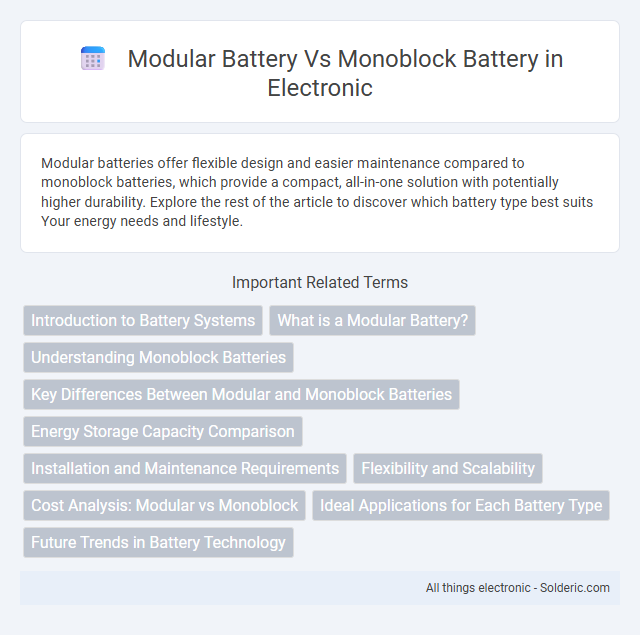Modular batteries offer flexible design and easier maintenance compared to monoblock batteries, which provide a compact, all-in-one solution with potentially higher durability. Explore the rest of the article to discover which battery type best suits Your energy needs and lifestyle.
Comparison Table
| Feature | Modular Battery | Monoblock Battery |
|---|---|---|
| Design | Multiple interchangeable modules | Single integrated unit |
| Scalability | High - add or remove modules easily | Fixed capacity |
| Maintenance | Easy - replace individual modules | Complex - entire unit must be serviced |
| Cost | Higher initial investment | Lower upfront cost |
| Weight | Generally lighter per unit | Heavier overall |
| Flexibility | Customizable capacity and configuration | Fixed size and output |
| Application | Electric vehicles, renewable energy storage | Conventional vehicles, backup power |
| Reliability | Higher with redundancy options | Lower due to single point of failure |
| Lifespan | Longer with module replacement | Limited by single unit wear |
Introduction to Battery Systems
Modular battery systems consist of multiple interchangeable cells or modules that can be independently replaced or upgraded, offering enhanced flexibility and scalability for various applications. Monoblock batteries are integrated units with all cells fixed in a single enclosure, providing compactness and simplified installation but limited customization. The choice depends on factors such as maintenance preferences, energy capacity requirements, and space constraints.
What is a Modular Battery?
A modular battery consists of multiple smaller, independent battery cells configured to function together, allowing easy replacement or expansion of individual modules. This design improves flexibility, scalability, and maintenance efficiency compared to monoblock batteries, which are single, sealed units with fixed capacities. Understanding the modular battery system can help you optimize energy storage solutions tailored to your specific power needs.
Understanding Monoblock Batteries
Monoblock batteries are sealed units where all cells are integrated into a single casing, ensuring a compact design that minimizes maintenance and leakage risks. These batteries provide consistent power output and are known for their durability and long service life in various applications, including automotive and renewable energy storage. Understanding the monoblock battery's structure can help you choose the right power solution based on reliability and ease of use.
Key Differences Between Modular and Monoblock Batteries
Modular batteries consist of multiple individual cells or modules connected to form a complete power source, offering enhanced flexibility, scalability, and easier maintenance compared to monoblock batteries, which are single, sealed units with fixed capacity. You can customize modular batteries for specific energy requirements and replace individual modules if needed, while monoblock batteries provide a more compact, cost-effective solution with simpler installation. The key differences lie in design, adaptability, maintenance, and application suitability, making modular batteries ideal for dynamic energy systems and monoblock batteries preferred for straightforward, low-maintenance needs.
Energy Storage Capacity Comparison
Modular batteries offer scalable energy storage capacity by connecting multiple smaller cells, allowing customization based on specific power needs, whereas monoblock batteries have a fixed capacity designed as a single unit. The modular design enhances flexibility and maintenance efficiency, as individual cells can be replaced or upgraded without discarding the entire battery. Monoblock batteries typically provide a compact, integrated solution but lack the adaptability to increase storage capacity beyond their original specifications.
Installation and Maintenance Requirements
Modular batteries offer simpler installation with individual modules that can be easily added or replaced, reducing downtime and minimizing maintenance complexity. Monoblock batteries require more effort during installation due to their larger, integrated design, and any maintenance or replacement typically involves handling the entire battery unit. Your choice depends on whether you prioritize ease of scalability and lower maintenance or prefer a single, robust battery solution.
Flexibility and Scalability
Modular batteries offer enhanced flexibility and scalability by allowing users to add or remove individual battery modules based on energy needs, facilitating easier upgrades and maintenance. In contrast, monoblock batteries consist of a fixed, single unit, limiting the ability to expand capacity or customize power output without replacing the entire battery. This modular design supports tailored energy solutions for varying applications, making it more adaptable to changing demand and future expansion.
Cost Analysis: Modular vs Monoblock
Modular batteries typically incur higher initial costs due to their flexible design and scalable capacity, making them ideal for customized energy solutions. Monoblock batteries often offer lower upfront prices with simpler installation and maintenance, benefiting standard applications with fixed power requirements. Over time, modular batteries can provide better cost efficiency through targeted upgrades and longer lifecycle management, reducing total ownership expenses compared to monoblock systems.
Ideal Applications for Each Battery Type
Modular batteries excel in applications requiring scalable energy storage, such as renewable energy systems and electric vehicles, where flexibility and ease of maintenance are crucial. Monoblock batteries are ideal for compact devices, backup power in telecommunications, and small-scale UPS systems due to their integrated design and reliability. Your choice depends on whether you prioritize expandability and customization or simplicity and space efficiency.
Future Trends in Battery Technology
Modular batteries offer enhanced scalability and easier maintenance compared to monoblock batteries, which are typically single-unit and less flexible. Emerging trends emphasize modular designs for electric vehicles and renewable energy storage due to their adaptability and potential for integrating advanced battery chemistries like solid-state technology. This shift supports longer lifespan, improved safety, and faster charging capabilities, positioning modular batteries as a key component in the evolution of next-generation energy storage solutions.
Modular battery vs monoblock battery Infographic

 solderic.com
solderic.com